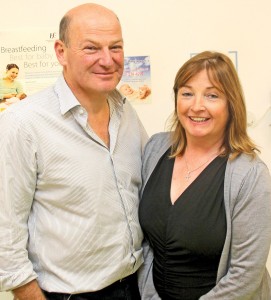
Not getting a smear test is now the biggest risk factor for cervical cancer, a local doctor told us, after a report from Ireland’s national screening service found that nearly one in three Dublin women have still not used the free testing service set up in 2008.
Dr Tony O’Sullivan and his wife, practice nurse Caitriona O’Sullivan, pictured right, have worked at the Irishtown and Ringsend Primary Care Centre for 15 years. “We have a lot of people coming in here for smear tests from all over Dublin. Anyone can book an appointment,” said Caitriona, who is also a midwife.
The couple have done thousands of smears at their Ringsend clinics.
“A few people are put off by the idea of the test itself, which is quite invasive, so we try to re-assure them that the staff here are very experienced and that we won’t hurt them. People really just want to know that we will be gentle and treat them well,” explains Caitriona.
Cervical smears are the best way to prevent cancer by detecting the early cell changes which can alert doctors that cancer is likely to develop in the cervix, or neck of the womb. But cervical cancer is still so scary for some women and girls in Dublin that some find reasons to avoid booking a test. “Fear of getting abnormal results is a big factor in putting off booking a test. It shouldn’t be,” says Dr O’Sullivan.
As one woman put it, “It was over quickly. I don’t know why I dreaded it. The best thing about it was that the whole thing was explained well beforehand and they answered all my questions. To be honest with you, I never really understood before what smear tests were all about.”
Tony and Caitriona both agree that the testing service has improved greatly. “Getting the results back used to take six months and cost €80. The free service now is great. People are well trained and we have the results back in three weeks. Women need to take a test every three years up to age 44 and every five years after that,” said Caitriona.
“The good news is that abnormal cervical cells which predict cancer are quite easy to treat if detected early. If the test shows abnormality, the next step is a colposcopy; a close look at the womb, which usually takes place at Holles Street Hospital,” says Dr O’Sullivan. Follow-up treatments include a Lletz procedure, which freezes and kills abnormal cells and so prevents cancer developing. This can also be done at Holles Street.
CervicalCheck, the National Screening Programme provides free smear tests for women aged 25 to 60. CervicalCheck says that women over 50 are less likely to have smear tests, however it is just as important for women who have reached menopause or finished having children to have regular smears as it is for women in their 20s.
Gráinne Flannelly of CervicalCheck is urging women to book free smear tests. She said, “I truly hope that women who have not yet had a smear test will take five minutes out of their busy day to arrange one. A smear test is nothing to be embarrassed about. It only takes a few minutes and doctors and practice nurses do hundreds a week.”
Another woman explained why she liked using the new service, “I was very happy that the programme allows you to choose your smear taker and that it doesn’t have to be your own doctor. I am very happy with my male GP for all my other care, but I appreciate that I can have my smear test taken by a female smear taker in another practice if I choose to.”
Once registered, you will be reminded by letter when your next smear test is due. For a list of registered smear takers and more information, please check their website www.cervicalcheck.ie or freephone 1800 454555.

